Water and Society 2011
First International Conference on Water and Society
5 - 7 December 2011
Las Vegas, USA
Overview
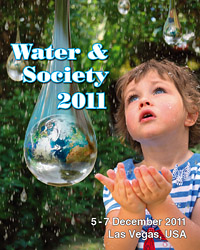 The first International Conference on Water and Society has recently taken place in Las Vegas, co-organised by the University of Nevada, represented by Professor Darrell Pepper, and the Wessex Institute of Technology, represented by Professor Carlos Brebbia.
The first International Conference on Water and Society has recently taken place in Las Vegas, co-organised by the University of Nevada, represented by Professor Darrell Pepper, and the Wessex Institute of Technology, represented by Professor Carlos Brebbia.
The conference provided a multi-disciplinary forum to present and discuss the many issues affecting water resources today. The meeting encouraged trans-disciplinary communication on issues related to the nature of water and its use and exploitation by society. The conference was initiated by the need to bridge the gap between the broad spectrum of social sciences and humanistic disciplines, bringing them together with specialists in physical sciences, biology, environmental science, health and others.
Water as the source of life is the most precious substance on the planet. Its comparative abundance has led to many misuses which will surely impair our common future. Problems such as water degradation and contamination are impossible to resolve without the participation of many different disciplines. These issues are by definition trans-national and relate to rights of states and hence it is essential to discuss them at international level to arrive at equitable and binding solutions that will ensure the rights of society to quality water supplies.
Opening Addresses
The conference was opened by Professor Darrell Pepper who referred to the importance of water as a worldwide issue related in part to the growth of cities - exemplified by the increasing number of megacities.
Professor Pepper also described the importance of the nexus between water and energy, as there exists a direct relationship between increase of energy and the need to employ more water. In this regard, the development of small nuclear reactors and distribution places has been proposed, concepts that may help to alleviate the challenges expected in the future. Another problem of course is the need to renovate ageing pipelines all over the world as well as building new distribution networks.
Following these remarks, Professor Carlos Brebbia referred to the work of the Wessex Institute of Technology (WIT) and in particular its knowledge dissemination activities. While research and advanced industrial services are focused at WIT’s New Forest campus, the cycle of conferences are co-organised with many prestigious institute’s such as the University of Nevada, and take place in different locations around the world. The motivation is to provide international forums to discuss a wide range of problems affecting our society. One of the most pressing, Professor Brebbia said, is finding solutions to the water resources needs of the modern world.
WIT – Professor Brebbia explained – has a number of conferences involving water resources, many of them focusing on international issues. It was felt essential to convene this meeting in order to bring together a range of specialists that could interchange experiences in fields as varied as hydrology to social sciences and economics. The water resources problem facing us requires integrated solutions beyond purely technical concepts.
The work of the institute’s meetings is reflected in the archive of past conference papers at http://library.witpress.com There it can be appreciated the wealth of knowledge accumulated since 1993 (when the series started) through the WIT conferences.
Professor Brebbia ended by wishing the conference all success, thanking the delegates for having come and hoping that they will be able to visit the Wessex Institute in the near future to better appreciate other side of the work of WIT.
Conference Sessions
The conference papers covered a series of sessions, as follows;
- The nature of water (Special Session organised by Professor G.H. Pollack of the University of Washington)
- Water as a source of life
- Water as a human right
- Water in a changing climate
- Water for society (special session organised by Professor Henning Bjornlund of the University of South Australia, and the University of Lethbridge, Canada)
- Future water demands and adaptation strategies
- Water resources contamination
- Water, sanitation and health
- Water resources management
- Irrigation
- Water and disaster management
- Lessons to be learned
Keynote Addresses
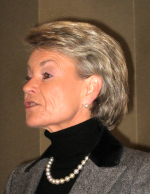
Pat oversees the operations of the Las Vegas Valley Water Districts as well as the Southern Nevada Water Authority, serving 2 million residents and nearly 40 million annual visitors.
As General Manager of one of the county’s most progressive water agencies, Pat is exceptionally active in regional and national water issues. She serves on several boards of agencies, foundations and associations at the national and regional levels. She also chairs the University of Nevada, Las Vegas College of Sciences Advisory Board.
Her talk discussed maintaining a safe, reliable water supply to a major metropolitan area in an area of scarce water resources. The regional urban centres continue to expand with phenomenal growth, exacting considerable strain upon the Colorado River system.
As the agency responsible for managing Southern Nevada’s water resources, the Southern Nevada Water Authority (SNWA) maintains a water resources plan that looks 50 years into the future. Historically, Southern Nevada relied almost exclusively upon the Colorado River, of which Nevada is entitled to 1.8% of its allocated flows. However, after a long period of drought, the Authority has been compelled to consider other sources to meet the community’s needs.
At the same time, water users throughout the southwest – both agricultural and urban – are coming to terms with the reality that the Colorado is significantly over-allocated. With the spectre of climate change looming over already-stressed river systems, water managers from Wyoming to California are focusing their efforts on increasing the flexibility of the water supplies and the efficiency with which they are used. Pat’s presentation described the strategies that will allow the southwest’s water managers to successfully navigate this challenging period.
Patricia finished by sharing the need to find integrated solutions to the water problems facing all regions of the world. Water needs for food, people, energy and the environment have to be balanced between the different users. The adjustment to the realities of water resources will not be easy for humanity.
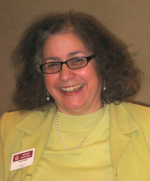
Irene is Emergency Manager of Clark Country as well as Planning Manager of its Nuclear Waste Division. She manages Clark County’s Nuclear Waste Oversight Programme which has been responsible for studying and overseeing the Department of Energy’s Yucca Mountain Project for nearly 20 years. The Yucca Mountain Project proposes to store 70,000 metric tons of high level radioactive waste and spent nuclear fuel in an underground facility about 90 miles from Las Vegas.
The keynote address by Professor Donald Hayes was entitled ‘Components of a suitable solution for Louisiana’s disappearing coastline’. Donald is chair of the Coastal and Environmental Engineering Department as well as a Director of Nevada University Transportation Centre at the University of Nevada, Las Vegas.
He has been until recently Director of the Institute for Coastal Ecology and Engineering at the University of Louisiana at Lafayette. He is a renown expert in surface water quality modelling, remediation of contaminated sediments, wetland engineering, and water resources systems planning.
During his talk, Donald referred to the considerable attention focused on the restoration of Louisiana’s receding coastline over the last few years. Many engineers have led extensive efforts to identify degrading areas and those at risk. Comprehensive restoration plans have been developed to restore lost ecological functions and protect existing ecosystems. His presentation focused on the sustainability of these solutions and offered practical strategies for the permanent protection of Louisiana’s coastline.
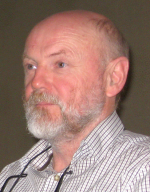
Water – Henning said – is becoming a valuable commodity, having changed not just in economic and financial terms, but also when looking at what society wants to achieve. “Not until the early 1990’s did we started talking about water as an economic good; before then it was a social good”.
Governments have in the past introduced policies to encourage water use in function of expansionary objectives. Water has been supplied at little cost to encourage use and expansion. The history of what has been called ‘supply management’ has resulted in some environmental problems which started to be apparent in the 1970’s. Since then, society values have changed. Healthy ecosystems and a sustainable environment have become increasingly important to secure high-quality source water for recreational and daily uses. Water in many watersheds has become scarce and competition has emerged. Who – asked Henning – should get access to water?
Society is facing some challenging questions, the answers to which are going to be tough and associated with serious socioeconomic impact with affected communities. During the expansion phase, government funded projects overcame the problems we are facing today.
Henning questioned if the governments are going to pay the cost of fixing these problems or leave them to market forces, treating water as an economic commodity. Water markets have already emerged in places such as the western United States, Australia and Canada to facilitate a re-allocation of water to meet new demands.
Henning’s keynote presentation discussed these issues based on his extensive research experience in Australia and Canada. It explained the community acceptance of re-allocation policies, the success and failure of the market as an instrument to facilitate re-allocation as well as the successes and failures of regulatory processes such as planning and community involvement.
Henning insisted on the need to have public participation in water management, to respect the rights of the environment; to see water as an economic rather than a social good; to price the water supply and have other economic aims to use it in a more efficient manner.
Water has been used in conjunction with economic incentives since the beginning of industrialisation. These incentives were aimed towards the expansion of resource extraction.
The question now is whether the new economic incentives will be successful in reducing water use as they were in expanding them.
With over-allocated and closed basins, growing populations and economic and increased demands to reduce extraction, our society – Henning concluded - is faced with a series of interrelated challenges.
Special Session organised by Professor Gerald Pollack
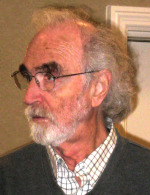
- ‘Water and biological time keeping’
- ‘Studies and observations on the health effects of electrolyzed-reduced alkaline water’
- ‘The Armstrong experiment as high voltage laboratory’
- ‘Prokaryotic transport in electrohydrodynamic structures’
Professor Pollack is due to receive the prestigious Prigogine Medal 2012 at a ceremony organised at the University of La Marche in Ancona, Italy. Ilya Prigogine was awarded the Nobel Price for Chemistry for his contributions to non-equilibrium thermodynamics, particularly in the theory of dissipative structures. The results of his research had profound consequences for understanding biological and ecological systems. Professor Prigogine, who was Honorary Chairman of a WIT conference held every two years, died in 2003. The Prigogine Medal, established by the University of Siena and the Wessex Institute of Technology to honour his memory, is awarded annually to a leading scientist in a field related to the biosphere.
Social Events and Conference Dinner
The conference was characterized by its friendly atmosphere and the many discussions that took place amongst scientists from different disciplines. This ensured the success of the meetings which aimed to bring together engineers, physical scientists, economists political and social scientists and others in an effort to discuss the serious problems affecting our society regarding the future of our water resources.

The interaction took place not only in the conference rooms but also during coffee breaks and over shared meals. Delegates were also invited to visit the Faculty of Engineering at the University of Nevada, Las Vegas, where the Dean gave them a short talk about the research carried out at the School.
The conference dinner took place in a renown steak house restaurant where they had occasion to taste some of the best steak in the USA as well as other specialities. The different dishes were accompanied by excellent Californian wines. At the end of the banquet, Darrell Pepper thanked the delegates for coming and helping make a success of this unique conference which is due to be reconvened in 2013 in a location and at a date to be decided shortly.
Publication of Papers
The proceedings of Water and Society, 576pp (Print ISBN: 978-1-84564-556-4; Online ISSN: 1746-448X) are available in paper and digital format from WIT Press priced at £347/US$498/€347. Orders can be placed on the WIT Press web site at www.witpress.com or by email:
Papers from the conference will also be hosted online at the WIT eLibrary as Volume 153 of WIT Transactions on Ecology and the Environment (Online ISSN: 1746-448X). For more details visit the WIT eLibrary at http://library.witpress.com

 Wessex Institute
Wessex Institute